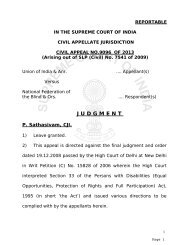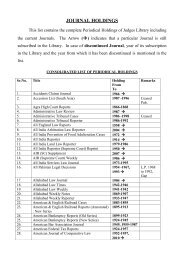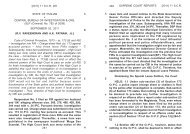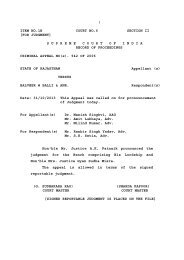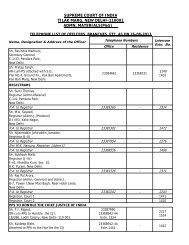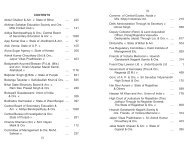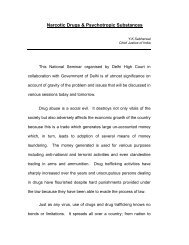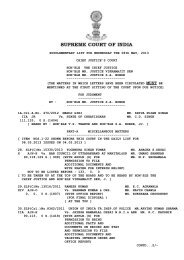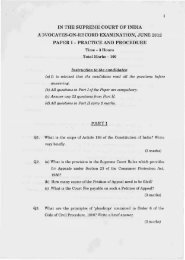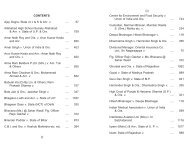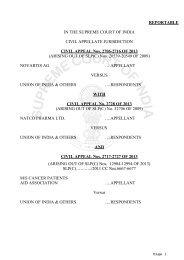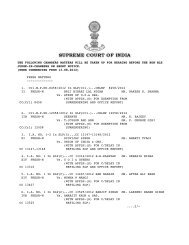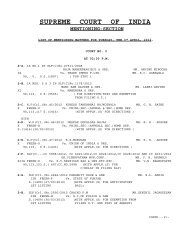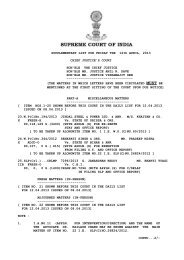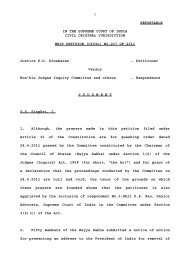Part No.IV - Supreme Court of India
Part No.IV - Supreme Court of India
Part No.IV - Supreme Court of India
Create successful ePaper yourself
Turn your PDF publications into a flip-book with our unique Google optimized e-Paper software.
MAHADEV GOVIND GHARGE v. SPL. LAO UPPER KRISHNA<br />
PROJECT JAMKHANDI, KARNATAKA<br />
provisions do not so specifically or even impliedly<br />
provide for the same. The provisions <strong>of</strong> Order XLI Rule<br />
22 <strong>of</strong> the Code are akin to the provisions <strong>of</strong> the Limitation<br />
Act, 1963, i.e. when such provisions bar a remedy, by<br />
efflux <strong>of</strong> time, to one party, it gives consequential benefit<br />
to the opposite party. Before such vested benefit can be<br />
taken away, the <strong>Court</strong> has to strike a balance between<br />
respective rights <strong>of</strong> the parties on the plain reading <strong>of</strong> the<br />
statutory provision to meet the ends <strong>of</strong> justice. If a crossobjector<br />
fails to file cross-objections within the stipulated<br />
time, then his right to file cross-objections is taken away<br />
only in a limited sense. To that extent a benefit is granted<br />
to the other party, i.e. the appellant, <strong>of</strong> having their appeal<br />
heard without such cross-objections. Still, however, if the<br />
<strong>Court</strong> is <strong>of</strong> the opinion that it is just and proper to permit<br />
the filing <strong>of</strong> cross-objection even after the expiry <strong>of</strong> the<br />
statutory limitation <strong>of</strong> one month, it is certainly vested<br />
with power to grant the same, but <strong>of</strong> course, only after<br />
hearing the other party. That is how the rights <strong>of</strong> the<br />
parties are to be balanced in consonance with the<br />
scheme <strong>of</strong> Order XLI Rule 22 <strong>of</strong> the Code. [Para 28] [857-<br />
C-H; 858-A]<br />
2.2. The provisions <strong>of</strong> a statute are normally<br />
construed to achieve the ends <strong>of</strong> justice, advance the<br />
interest <strong>of</strong> public and to avoid multiplicity <strong>of</strong> litigation.<br />
Strict construction <strong>of</strong> a procedural law is called for where<br />
there is complete extinguishment <strong>of</strong> rights, as opposed<br />
to the cases where discretion is vested in the courts to<br />
balance the equities between the parties to meet the ends<br />
<strong>of</strong> justice which would invite liberal construction. Under<br />
Order XLI Rule 22 <strong>of</strong> the Code, cross objections can be<br />
filed at any subsequent time, even after expiry <strong>of</strong> statutory<br />
period <strong>of</strong> one month, as may be allowed by the <strong>Court</strong>. It<br />
is evidently clear that there is no complete or indefeasible<br />
extinguishment <strong>of</strong> right to file cross objections after the<br />
expiry <strong>of</strong> statutory period <strong>of</strong> limitation provided under the<br />
835 836<br />
A<br />
B<br />
C<br />
D<br />
E<br />
F<br />
G<br />
H<br />
A<br />
B<br />
C<br />
D<br />
E<br />
F<br />
G<br />
H<br />
SUPREME COURT REPORTS [2011] 8 S.C.R.<br />
said provision. Cross-objections within the scheme <strong>of</strong><br />
Order XLI Rule 22 <strong>of</strong> the Code are to be treated as<br />
separate appeal and must be disposed <strong>of</strong> on same<br />
principles in accordance with the provisions <strong>of</strong> Order XLI<br />
<strong>of</strong> the Code. [Para 32] [858-G-H; 859-A-D]<br />
2.3. The <strong>Court</strong> is required to give precedence to the<br />
right <strong>of</strong> a party to put forward its case. Unnecessary and<br />
avoidable technical impediments should not be<br />
introduced by virtue <strong>of</strong> interpretative process. At the same<br />
time any irreparable loss should not be caused to a party<br />
on whom the right might have vested as a result <strong>of</strong><br />
default <strong>of</strong> other party. Furthermore, the courts have to<br />
keep in mind the realities <strong>of</strong> explosion <strong>of</strong> litigation<br />
because <strong>of</strong> which the <strong>Court</strong> normally takes time to<br />
dispose <strong>of</strong> appeals. It would be a travesty <strong>of</strong> justice, if<br />
after passage <strong>of</strong> substantial time when the appeal is taken<br />
up for final hearing a cross-objector who was heard and<br />
participated in the hearing at the admission stage itself,<br />
claims that the limitation period for him to file his crossobjection<br />
will commence only from the date <strong>of</strong> service <strong>of</strong><br />
a fresh notice on him or his pleader, in terms <strong>of</strong> Order XLI<br />
Rule 22 <strong>of</strong> the Code. Such an interpretation would<br />
jeopardize the very purpose and object <strong>of</strong> the statute and<br />
prejudicially affect the administration <strong>of</strong> justice as the<br />
appeal which has come up for final hearing and disposal<br />
would again be lost in the bundle <strong>of</strong> pending cases on<br />
this pretext. It is trite that justice must not only be done<br />
but must also appear to have been done to all the parties<br />
to a lis before the <strong>Court</strong>. [Para 34] [860-C-F]<br />
2.4. Procedural laws, like the Code, are intended to<br />
control and regulate the procedure <strong>of</strong> judicial<br />
proceedings to achieve the objects <strong>of</strong> justice and<br />
expeditious disposal <strong>of</strong> cases. The provisions <strong>of</strong><br />
procedural law which do not provide for penal<br />
consequences in default <strong>of</strong> their compliance should



